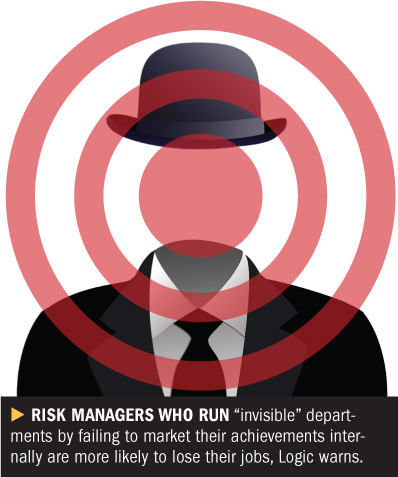For risk managers to keep their jobs in this difficult economy, they must remain “highly visible” by making sure their senior management and board members appreciate the bottom-line savings that loss control, safety programs and alternative risk-transfer efforts produce, according to Bill Perry, president of Logic Associates.
 “Risk managers need to stand up and take credit for all they are doing by quantifying their bottom-line contributions,” said Mr. Perry, in analyzing the results of the “2010 Risk Management Compensation Survey,” conducted by National Underwriter, in partnership with Logic Associates. “Hard numbers that put risk management in a very positive light will give companies pause before cutting into their departments.”
“Risk managers need to stand up and take credit for all they are doing by quantifying their bottom-line contributions,” said Mr. Perry, in analyzing the results of the “2010 Risk Management Compensation Survey,” conducted by National Underwriter, in partnership with Logic Associates. “Hard numbers that put risk management in a very positive light will give companies pause before cutting into their departments.”
When push comes to shove, he added, “not much has changed in terms of how you keep your job as a risk manager. You not only have to perform, but you have to show everyone above you that you are performing. It's like the tree falling in the forest–if no one is there to witness what you are saving the organization, it's like it never happened.”
Mr. Perry suggested that “those who are losing their jobs today are often out of work because of their invisibility. They are on the target list for layoffs because they've run an invisible department. They haven't been out there consistently letting the powers that be know exactly what they're doing and how much money they're saving for the organization.”
One factor operating in favor of risk managers is the downward trend in terms of insurance pricing. “We're lucky to have a soft commercial insurance market to fall back on right now,” noted Mr. Perry. “That makes it a lot easier to lower the cost of risk and cut the budget by paying less for insurance, rather than having to lay off one of their risk management people.”
For those fearful of seeing their department downsized or their function outsourced, “whether you stand out in today's hyper-competitive job market depends on your skill set. What can you do beyond just calling your insurance broker and going over policy quotes? Did you put a captive in place, or are you managing a significant self-insured retention? Have you initiated any safety programs that have prevented property losses or kept people on the job, while cutting claims?”
He said the second crucial factor is a risk manager's education. “Risk management is a knowledge business, but too few are continuing their education so they have the expertise and credentials to set themselves apart,” according to Mr. Perry.
Just one-third of the 287 risk managers surveyed this year have a Master's degree, while fewer than one-in-five earned a CPCU designation. Only 40 percent have an Associate in Risk Management credential.
“The most important degree a risk manager can get these days is an MBA in Finance, because you can then speak the language of those above you–whether they are the CFO or the treasurer,” Mr. Perry advised. “Getting a CPCU or an ARM can be very important as well in doing your day-to-day job, but you don't want to just be seen as 'the insurance guy.' You want to be the one who gets the bigger picture financially and operationally.”
The survey found there's plenty of room to grow for risk managers looking to expand their job portfolio and increase their importance to the organization.
For example, only 6 percent said they now have direct responsibility for data security, even though exposures are growing to critical levels in that area. About 44 percent say they at least “advise” on such risks, but about the same percentage reported no involvement.
Regulatory compliance is another growing challenge, yet only 15 percent of respondents affirmed they have a direct say over managing those risks. A little over one-third do advise their companies on compliance issues, however.
Involvement in enterprise risk management is picking up, with over one-third taking at least an advisory role in that emerging discipline, and nearly one-third directly responsible for ERM.
However, there is a limit as to how far risk managers can stray before potentially putting their jobs at risk, Mr. Perry warned.
“Those who are most vulnerable might be the risk managers who ventured outside their realm into non-insurance-related work like human resources, systems administration, or even senior management,” he said. “In fact, a promotion like that could be the kiss of death if a risk manager isn't careful.”
He conceded that many risk managers feel “pressure to keep moving up. You've got a risk manager who has done well, trained their assistant well, who is looking to promote their assistants, but moving into another sector means giving up your risk management franchise.”
That can be a big problem in a shrinking economy, he cautioned. “When layoffs come, the person with the least experience in a department is often the first to go,” Mr. Perry noted. “In risk management you had the advantage of experience, but that's lost when moving out of risk management. Once you lose that new job, your experience doesn't qualify you for similar non-risk management jobs elsewhere against those with more time in those positions.”
Basically, he summarized, “once you give up risk management, who are you? A small percentage may pull off the transition and are very successful, but in this economy they are also very vulnerable.”
However, he hastened to add, “this does not hold true for those who have grown within risk management. You are still in your clear area of expertise, and the growth is built on a more solid foundation. You get to maintain your franchise.”
That means “if you grow vertically within risk management–including those who have become a chief risk officer, or launched a captive or an enterprise risk management department, or set up a new security or safety program–you become harder to replace and easier to place elsewhere in a new job within the profession,” according to Mr. Perry.
He concluded that “we're now more in the age of the specialist rather than the jack-of-all-trades. It becomes harder to replace that expertise, and harder to delegate to another department, if you are an absolute expert in what you do. That's especially true in risk management, which is a rather small community by comparison with bigger professions like accounting, security, HR or systems administration.”
Still, for those looking to move on within the profession, “it's very hard to get a new job in risk management today,” warned Mr. Perry. “First of all, most risk managers are staying put if at all possible–mainly because the salaries being offered in this economy by those who are hiring are not up to the numbers being thrown around in better times. That means there are fewer openings available.”
He advised that “if you are going to move, look to trade up. Even a lateral move salary-wise to a more attractive industry or more challenging environment will help boost your career in the long run.”
Want to continue reading?
Become a Free PropertyCasualty360 Digital Reader
Your access to unlimited PropertyCasualty360 content isn’t changing.
Once you are an ALM digital member, you’ll receive:
- Breaking insurance news and analysis, on-site and via our newsletters and custom alerts
- Weekly Insurance Speak podcast featuring exclusive interviews with industry leaders
- Educational webcasts, white papers, and ebooks from industry thought leaders
- Critical converage of the employee benefits and financial advisory markets on our other ALM sites, BenefitsPRO and ThinkAdvisor
Already have an account? Sign In Now
© 2025 ALM Global, LLC, All Rights Reserved. Request academic re-use from www.copyright.com. All other uses, submit a request to [email protected]. For more information visit Asset & Logo Licensing.








